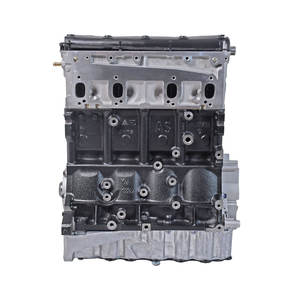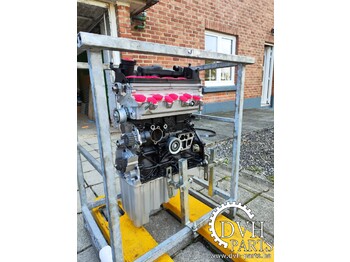Browsing the Refine of Engine Selection: Secret Elements to Consider
The process of engine choice is a multifaceted endeavor that requires mindful analysis of numerous critical variables to make certain placement with operational objectives. Performance demands, gas effectiveness, and financial restraints are simply the start; considerations around environmental impact and maintenance support play an essential function in the decision-making framework.
Performance Requirements
When selecting an engine, it is important to establish clear efficiency demands that straighten with the designated application. Performance demands incorporate a variety of elements, including power output, torque characteristics, and responsiveness, which must be tailored to the certain needs of the car or equipment concerned.
Power output, commonly determined in horsepower, determines the engine's capability to move a car or execute a job successfully. Torque, on the other hand, is essential for applications requiring strong preliminary acceleration or heavy lifting capacities. An understanding of the functional atmosphere is also vital; for circumstances, engines created for off-road applications may require different efficiency attributes contrasted to those meant for freeway use.
Moreover, take into consideration the operational load and obligation cycle, as these elements affect the engine's longevity and dependability. In high-load scenarios, a durable engine style may be essential to stop premature wear or failure. In addition, performance demands need to also include factors to consider for exhaust standards and regulatory conformity, especially in regions with stringent environmental regulations. By specifying these performance criteria early in the selection procedure, stakeholders can make informed choices that enhance general functional performance and effectiveness.
Fuel Effectiveness Considerations
While efficiency requirements are vital, fuel effectiveness is similarly essential in the engine choice process, as it directly impacts operating expense and ecological sustainability. Fuel-efficient engines eat much less fuel per unit of work done, which not just minimizes overall expense however additionally decreases greenhouse gas exhausts. As organizations progressively focus on sustainability, picking an engine that maximizes gas effectiveness can enhance corporate obligation and conformity with ecological regulations.
When reviewing gas effectiveness, it is vital to consider the engine's design and innovation - amarok engine for sale. Advancements such as turbocharging, direct fuel shot, and crossbreed systems can significantly enhance fuel economy. Furthermore, understanding the operating problems and responsibility cycles of the engine application is vital; engines may do differently under varying tons and rates
Moreover, producers usually offer gas consumption data that can be utilized to compare various engine choices. It is a good idea to examine these specs in real-world situations to guarantee precision. The kind of fuel utilized can also affect gas effectiveness; alternate gas might offer much better performance and reduced exhausts. In summary, gas performance is a multi-faceted consideration that needs thorough examination during the engine selection procedure.
Budget Plan and Cost Analysis
Budget plan and price evaluation serves as a crucial component in the engine selection procedure, influencing both short-term financial investments and long-term functional expenditures. When examining prospective engines, it is important to take into consideration not just the preliminary purchase cost however also the overall price of ownership, which includes setup, maintenance, gas intake, and possible downtime.
A detailed analysis must begin with the upfront expenses connected with the engine, including required modifications or supplementary tools. However, focusing entirely on preliminary expenditures might bring about misguided choices. Evaluating operating costs over the engine's life expectancy is similarly important, as extra expensive engines might supply remarkable gas performance or reduced upkeep demands, ultimately causing set you back savings.

Ecological Influence Elements
Comprehending environmental effect variables is vital in the engine option process, as sustainability considerations have become increasingly vital for both regulatory conformity and corporate responsibility. Organizations should evaluate the emissions created by various engine types, including carbon dioxide, nitrogen oxides, particle matter, and unburned hydrocarbons. These exhausts add substantially to air pollution and climate change, demanding a cautious analysis of the engine's eco-friendly impact.
Furthermore, gas kind plays an essential function in ecological impact. Engines powered by renewable resource resources, such as biofuels or hydrogen, have a tendency to have a lower environmental effect contrasted to conventional nonrenewable fuel sources. Additionally, the lifecycle assessment of the engine, from manufacturing via operation to disposal, should be taken into consideration to understand the full extent of its environmental ramifications.

Maintenance and Support Alternatives
When picking an engine, the accessibility of maintenance and assistance options is a critical consideration that can substantially affect functional performance and durability. Comprehensive upkeep prepares guarantee that the engine operates at peak efficiency and reduces unexpected downtimes. It is important to review the maker's her explanation support network, consisting of the schedule of certified service technicians and service facilities.
Analyzing the accessibility of spare components is additionally crucial. A reliable supply chain for elements can minimize lead times for repair work and maintenance, consequently enhancing total productivity. Additionally, think about the simplicity of getting technological documentation and training resources, which are crucial for ensuring that workers are well-equipped to handle regular and emergency situations.
One more essential element is the warranty and service arrangements offered by the supplier. Ultimately, an aggressive method to upkeep and assistance not only prolongs the life of the engine however likewise adds to the total success of the operation.
Conclusion
To conclude, the procedure of engine selection requires an extensive analysis of various important variables, consisting of performance demands, gas performance, budget constraints, environmental influence, and upkeep support. By carefully evaluating these components, educated choices can be made that align with operational goals and sustainability goals. Inevitably, a critical strategy to engine selection click reference will certainly ensure optimum performance and long life while dealing with economic and ecological factors to consider effectively.
While efficiency needs are crucial, gas efficiency is just as vital in the engine option process, as it directly influences operating prices and ecological sustainability. As companies significantly focus on sustainability, choosing an engine that enhances gas performance can improve business duty and conformity with ecological guidelines.
In addition, understanding the operating conditions and task cycles of the engine application is vital; engines may carry out in a different way under differing speeds and tons. (amarok engine for sale)
Reviewing operating expenses over the engine's lifespan is equally important, as a lot more costly engines may offer exceptional fuel efficiency or minimized upkeep needs, inevitably leading to set you back financial savings.
In verdict, the procedure of engine selection requires an extensive assessment of numerous vital factors, consisting of efficiency demands, fuel efficiency, budget plan constraints, my response ecological effect, and maintenance support. - amarok engine for sale
 Tony Danza Then & Now!
Tony Danza Then & Now! Brian Bonsall Then & Now!
Brian Bonsall Then & Now! Jason J. Richter Then & Now!
Jason J. Richter Then & Now! Macaulay Culkin Then & Now!
Macaulay Culkin Then & Now! Kelly Le Brock Then & Now!
Kelly Le Brock Then & Now!